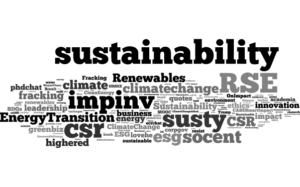Does social media equal information overload? How can we manage the sheer volume of data, and is there any value in ranking our performance? In the second of our blog posts on the #thinklist, we discuss measurement in academia and the institutional classification of academic activities. Specifically, we consider, what does the #thinklist tell us about responsible business scholarship?
The hashtags that count
 In preparation for the #thinklist event, we ran some analysis on the content in the tweets of our thinklisters. Working with Alesssandro Caliandro in the School of Management at the University of Bath, we extracted around 3,000 tweets from the top 20 thinklisters. Performing some simple content analysis, Alessandro was then able to discern this ‘hashtag cloud’ of the most influential hashtags on Twitter.
In preparation for the #thinklist event, we ran some analysis on the content in the tweets of our thinklisters. Working with Alesssandro Caliandro in the School of Management at the University of Bath, we extracted around 3,000 tweets from the top 20 thinklisters. Performing some simple content analysis, Alessandro was then able to discern this ‘hashtag cloud’ of the most influential hashtags on Twitter.
There are a few interesting observations to take from this. First, that sustainability is so prominent – as is CSR and its international equivalents (e.g. RSE).
As noticed by @JrmyMorales, there is a lot of French words! 💪🇨🇵 #RSE #CLIMAT #THINKLIST @BathCBOS #CSR https://t.co/0nPGX9jmhM
— Wafa BEN KHALED (@Wafa_BK) November 28, 2018
Second is how visible particular voices are in the aggregate. #Impinv, for instance, is a hashtag cultivated by Cathy Clark related to impact investing and social entrepreneurship. Far from just curating knowledge, this hashtag supported Cathy in creating an online community; a theme we reflected on in last week’s blog post and a post earlier in the year when we interviewed Cathy. She started using Twitter to keep in touch with her academic community when her ability to travel and attend conferences was limited. Using hashtags, and particularly #impinv, helps Cathy manage the huge volume of information that comes through social media, and indeed one of her top tips for other Twitter users was to use hashtags to sift information and follow the things that really matter to you:
'I think it’s hugely efficient, but it’s all about using the hashtags - whether event hashtags, group hashtags, topic hashtags. I look in the morning to see what events are going on, then I might follow that hashtag for the rest of the day.'
Stratification
Finally, such an approach enables us to add some measurement to the content of responsible business tweets. But what do we gain from turning the art of online engagement into a science? What does the stratification-turn mean for academics? Should the #thinklist be a ranking?
These questions were reflected on at the #thinklist event, provoked largely by Mark Carrigan’s insightful key note and associated blog post. One of the most arresting slides from Mark's presentation was when he showed the Internet Live stats, which emphasise just how much content there is to sift through.
Academics and social media? The overwhelming speed of internet life stats at the great #thinklist event, kindly organised by @BathCBOS in London, with @ethicscrane @drsarahivory @mosonyi @antirapani @drtoubiana @antirapani @thomroulet pic.twitter.com/9tXlVqKpjO
— Dr Zahira Jaser (@ZahiraJaser) November 28, 2018
One of Mark’s main points is that stratification can make overloaded content more manageable. Perhaps we need a mechanism for organising data, particularly in the age of ‘big data’. Yet, Mark was also critical of the need for stratification:
‘Don’t pursue visibility as an end in itself, it will follow if you’re doing something which people find valuable. Don’t pursue influence, it will come if you can build meaningful relationships with people. Don’t obsess over the metrics, they get in the way of strategizing more often than they help you formulate a strategy.'
For some thinklisters such as Lauren McCarthy, another academic ranking is not helpful and takes the fun away from our social media activities. Lauren argues that we need to enable more voices on social media, and rankings such as this only drive the same voices. Is there a way that we can encourage more voices in social media on the topic of responsible business? Perhaps widening out the #thinklist to other faculties beyond business schools may help with this.
Mark Carrigan counters that an initiative like the #thinklist is helpful, not only because it offers a way of sifting through otherwise unmanageable amounts of data, but also because it 'provides a expertise-driven counter point to the computational generalisation of social media algorithms'. However, he also comments that there are some fundamental questions we need to think through if we want to get the most of social media:
- What makes someone relevant?
- What makes their work valuable?
- What accounts for their influence?
- Why should we seek to be influential?
Please do share your thoughts with us and stay tuned for our final blog post reflecting on the #thinklist event, when we look at some of the downsides of having a high social media profile, and reflect on the conflicts between public and private personas.
Header image by rawpixel
Respond



